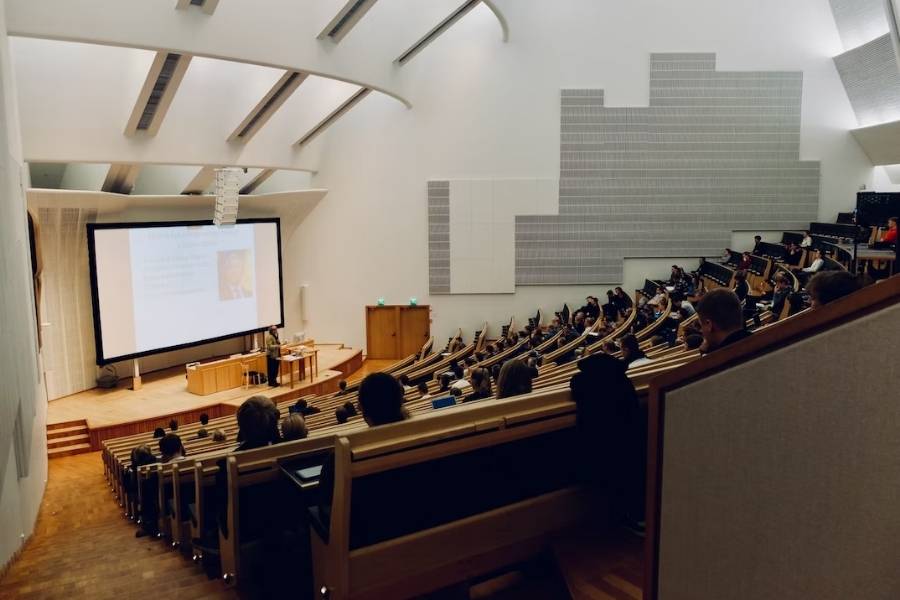You've said goodbye to your fellow sixth formers, you've had the parties or holiday and you've said your tearful goodbye to your parents - now what? Having this level of independence can be liberating for most students but for others it could be a stressful and anxious time. Meeting new people should be top of your list when you start university. If you are lucky enough to be in halls of residence on campus it will be hard to hide with all the facilities and meeting places available within a short distance. On your course also they may have ice-breaking meetings to start with or some sort of socialising opportunity which you could attend.
Confused by the jargon? Check out our higher education glossary.
In this section we will cover the experiences of a student's first week:
The First Day
My first day at uni was strange, which is not uncommon. My parents had set off at an ungodly hour 'to miss the traffic' on the M1, which we managed, and in fact, only saw one other car stuffed with king-size quilt and weedy pot plant on the way to Leeds. I'd lugged all my boxes up the three flights, my parents had said goodbye and I was left in my new room (which had a slight hospital look about it); bare except for the electrical equipment my dad had to plug in before he left, all before 10am, with barely anyone else in the entire complex.
People gradually arrived, and with nothing else to do, I went round knocking on everyone's door in my building, gathering people a la Pied Piper of Hamlin as I went and met two of my best friends like this (although I suppose I had thirty two foul attempts!). This is definitely a good ice breaker though, and if you feel nervous, remember, everyone else does too, so just try to be chatty and friendly. It also gave me a lot of people to talk to that night, at the first drink in the hall bar. Meeting six hundred in one go definitely makes you overwhelmed by names, and most I'll never remember, but it all starts somewhere, and from experience, it's usually in the bar!
Hall social is good preparation for Fresher's Ball, obligatory drunken night with thousands of other freshers, a few third year letches (you'll start to recognise them), and terrible 80's throwback (we had Chesney Hawks). A good idea is to get your parents to pay for the tickets before they go, in a specially crafted, 'I'd like to go, but I'm going to have to be careful with my money' kind of way, that becomes fairly tired by the end of the second year.

Money
Money or lack of it is probably the most uniting factor of students nationwide. For most people a student loan is essential, which is better if you've sorted it all before you come to uni, but you can apply all year, up until June (see the Student Loans Company's website). However, to receive your first instalment, you need to register for your course, which typically involves waiting in a three hour queue after you've wandered around the electives fair and picked your other modules. Make sure the number of credits adds up to what you are meant to be doing, because I realised in November that I was 20 credits short, and the only department that would help me catch up was the chaplaincy, and I ended up spending 3 hours a week with a very kind vicar learning Spirituality, when really, I could have been doing something a little more interesting!
You might need to set up a bank account if you don't already have one, and there are plenty of offers to entice you to different banks; from free toasters to £50 cash.
Freshers Fair
At the Freshers fair, around the same place as registration, there are hundreds of clubs you can sign up to, and going along to them is a brilliant way to meet people who are into the same things as you. I signed up to tons of clubs, but found in my first term I didn't really have time for them, but in my second year, I whittled in down to writing for the paper and joining the ski club.
As you've practically wasted a day anyway, you might as well register for your new doctor the same day - probably best not to wait till the actual emergency, and you suspect you have meningitis (light hurting your eyes, feel sick, can't get out of bed; could also be a hangover). This just means that your uni town is where your permanent doctor is and when you go home, if you need something, you just fill out a form as a temporary patient.
But going home is something I think you should try to avoid in the first month. You will get a bit homesick, it's only natural, and everyone I know was a little down sometimes, so don't feel like you're on your own. If you don't feel like you can confide in your new friends, and your best friend from home is always out, there are plenty of people willing to listen. The university will have counsellors, look on their website under welfare, you should have been assigned a personal tutor, or in your hall, the wardens can listen to your problems. But it becomes so much easier, and though the first day of the Christmas holidays, you will be packed up and waiting to be picked up, a year on you'll be debating whether to go home for a full week.
During Fresher's week, your hall will probably organise events for you to get to know other people and your new town and generally they're a really good idea. If you decide to organise one yourself, bear in mind, that although clubs with drinks priced at £1 seem fantastic, they are usually meat markets that Freshers get herded into (along with those third year boys). Take this however you like; if you are carefree, single and have just left home for the first time this is probably exactly what you want. But if anyone went to those under-18 nights at Camden Palace and didn't like them, opt for the classier £1.50 vodka redbull offers!
For all these nights, NTL offers, cheap sandwiches etc, you'll get a lot of flyers thrown in your face in the first week - some come in bags with free chocolate. This all seems thrilling at first, but like the stale smell of pizza in your hall corridor, you'll learn to ignore them, or you'll see what an easy job it is and apply to your favourite club. For a more impartial and experienced view of the city and its clubs and everything else, try to find your student paper - usually somewhere in the union, or it might be online - which will have club listings and reviews.
Lectures
After the first week of carefree parties, the second week of introductory lectures at 9am comes as an unjustified shock. I have found that you will never get used to this if you study English, history or arts in general and see as unfair that you have to get up before midday when you only do seven hours a week anyway. Unfortunately, you'll have to get used to it if you study engineering or worse, medicine, but remember there was a choice on the UCAS form!
After trying out some of the lectures on your course and you decide that it's really not for you, it's best to let someone know as soon as possible, but give this careful consideration. A lot of people I know switched courses before 'half term' week (which you don't get at uni; it's renamed reading week for arts courses), but lots of people were also able to change after the first year. You don't want to change and then realise that it was the one after all. I was quite unsettled by the little amount of work I had to do; after studying for four A levels, seven hours a week of English didn't seem right. I've become much more adapted now, and can see that the pressures are just different; some weeks are very laid back, others you have four essays in for (obviously the more sensible thing is to plan ahead, but I keep convincing myself that I work much better under pressure.)
If your seminars and lectures organise group work, then you're bound to make extra new friends on your course - if not, just start introducing yourself again, you'll be perfect at it by now!
Above all though, the first year of university is about having fun, meeting people and getting at least 40% to get through to the next year.




